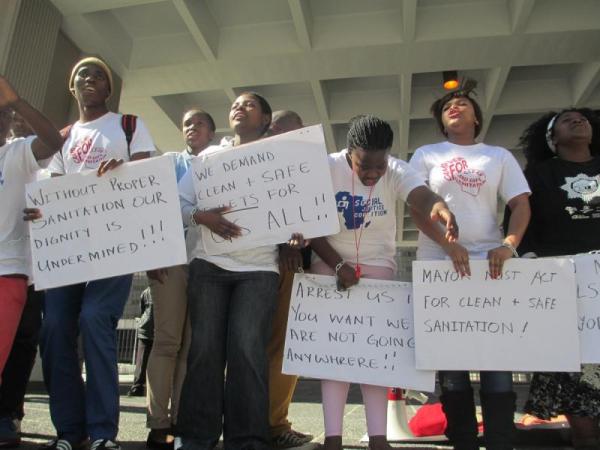SJC trial: “We wanted the City to see we were serious”

Emotions ran high in the Cape Town Magistrates’ Court on Wednesday as Social Justice Coalition’s(SJC) general secretary, Phumeza Mlungwana, was cross-examined about last year’s protest on the steps of the Cape Town Civic Centre.
Mlungwana and 14 others chained themselves to the railings on the steps of the Civic Centre on 11 September 2013 as a protest against poor sanitation in Khayelitsha. They said they wanted to get Mayor Patricia de Lille’s attention.
They have been charged under the Regulation of Gatherings Act with convening and attending an illegal gathering.
Mlungwana has throughout the trial insisted that only 15 people were part of the protest.
Questioned by state prosecutor Nazieroedien Rajab about the events leading to the protest, Mlungwana said several meetings had been held before the protest and at one of these meetings a decision had been taken that permission would not be asked from the City for the protest to go ahead.
“We know the process of applying for a permit to protest but we chose not to do so. We made this decision based on a number of reasons. We saw it as an urgent matter; it was a matter of showing how frustrated and angry we were; we wanted this protest to carry some weight and we wanted the City to see how serious we were,” said Mlungwana.
The SJC had ten branches, Mlungwana said, and each branch had chosen who to send to the protest. In the end 15 people had been chosen to be part of the chain.
The court was shown photographs of the protest and in one, Rajab counted 18 people who were standing close to each other as if part of the chain. But Mlungwana said they were not part of the chain but were members who were standing very close.
“When the 15 of us arrived at the Civic Centre, we had less than 10 people with us who were there as support. They would be bringing us food and water and others would be handing out media statements,” said Mlungwana.
Questioned about the other people who joined the protest, she said that the plan was not for people to join, but that once people had heard them singing, they had joined in the songs. She said the number of people had grown as the day progressed, including media who were there to cover the protest.
Mlungwana said as people got more frustrated, some had moved closer to the chain and this had caught the attention of the police who had told them to leave because there were more than 15 people “chained” to the steps.
“We told the others who had joined us to move away, and they did, but the police insisted that we move because they said since we did not have a permit [and] what we were doing was illegal,” said Mlungwana.
Asked whether the SJC had used other avenues before the protest to get their point about sanitation across, Mlungwana said the SJC had sent emails and letters to the City of Cape Town, conducted social audits, held meetings and educational workshops, and organised toilet queues and awareness campaigns, but nothing had worked.
Defence advocate Michael Bishop questioned Mlungwana about the emotions of the people involved in the protest, including herself, on the day.
“I was emotional and there is no way that any of the people who were protesting were not emotional,” she said.
She said about eight of the accused were “directly affected” by the struggle over toilets and poor sanitation in Khayelitsha.
“I have a baby now who was born in 2014 and my child will have to grow up in these conditions.
“We were all emotional and frustrated because of this fight for sanitation. That day we just wanted the Mayor to come out and commit. We wanted results, acknowledgement. We didn’t want to engage with them, we have done that many times,” said Mlungwana.
Written closing arguments will now be filed by the SJC’s lawyers and judgement in the case is expected on 28 November.
Next: A man passes a fruit stall in Khayelitsha Station business hub. Photo by Masixole Feni.
Previous: Lwandle commission recommends reforms to prevent illegal evictions

This article is licensed under a Creative Commons Attribution-NoDerivatives 4.0 International License.


